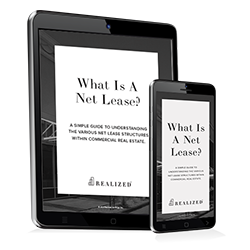
Depreciation is one of the best tax deductions for real estate investing. It’s a non-cash flow expense because it doesn’t affect an investor’s bank account but can reduce taxable income.
Can tenants in a triple net lease (NNN) take a depreciation expense, or is the expense reserved for the building owner? This article will discuss how depreciation works with a triple net lease.
What Is A Triple Net Lease?
In a NNN lease, the property owner doesn’t transfer all risk to the tenant, which is the case for an absolute lease. The landlord is still responsible for some capital expenses, such as the roof and parking lot.
A NNN lease requires the tenant to pay base rent, taxes, insurance, maintenance, and common area expenses. This leaves the property owner to cover structural repairs such as the roof, HVAC, and parking lot. The lease agreement details specific responsibilities and can vary with each lease.
NNN leases are generally for 10 years. Credit tenants such as large franchises or retail stores are often the lessees of a NNN lease.
If the tenant is paying for so much of the property, can the tenant deduct depreciation?
Triple Net Lease And Depreciation
Since the property owner holds title to the property, they are the ones who are able to take a deduction for the annual depreciation expense. A depreciation expense lowers taxable income.
Some property owners use bonus or accelerated depreciation to take a larger depreciation expense in the first years of property ownership. This can help offset significant amounts of income.
Since a NNN lease is a commercial property lease, the regular (i.e., straight line) depreciation deduction is spread across a 39-year life span.
The tenant is not able to deduct depreciation. However, the tenant can still deduct various operating expenses related to the lease. The lease payment may be one of those expenses. The tenant and his accountant will need to decide which expenses can be deducted.
When the property owner decides to sell the building, they may have to pay back some depreciation in a process called depreciation recapture. Investors can utilize a 1031 exchange to defer gains and depreciation recapture taxes on the sale of a property when trading into a “like-kind” property.
This material is for general information and educational purposes only. Information is based on data gathered from what we believe are reliable sources. It is not guaranteed as to accuracy, does not purport to be complete and is not intended to be used as a primary basis for investment decisions. All real estate investments have the potential to lose value during the life of the investment. All financed real estate investments have the potential for foreclosure. Investing involves risk, including possible loss of principal. A bond's yield, share price and total return change daily and are based on changes in interest rates, market conditions, economic and political news, and the quality and maturity of its investments. In general, bond prices fall when interest rates rise and vice versa. Realized does not provide tax or legal advice. This material is not a substitute for seeking the advice of a qualified professional for your individual situation. Costs associated with a 1031 transaction may impact investor’s returns and may outweigh the tax benefits. An unfavorable tax ruling may cancel deferral of capital gains and result in immediate tax liabilities.



